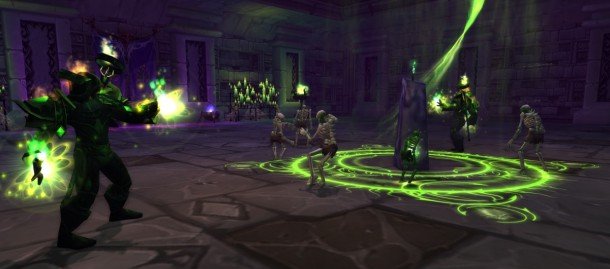Blizzard “very happy” with subscription model, say free to play can “burn out” players

When Blizzard announced that they were ditching the talent tree system from World of Warcraft, they proved that there was no aspect of the MMORPG that they weren't willing to shine a critical light on. Talent trees were one of WoW's great innovations, and a model that has been borrowed wholesale by almost every game to chase WoW's crown - but even then they weren't safe from the march of progress.
Yet in other areas, Blizzard have been accused of falling behind the times. Traditional subscription-based MMOs are in decline, with the majority of the old guard gradually transitioning to a free to play model that has proven itself, and no longer necessarily indicates a game in desperate straits. We asked game producer John Lagrave whether WoW's payment system was next under the microscope.
“We're very happy with the sub model - it works very well for us for various reasons. You churn through a lot of content very quickly on a paid-for game, and we think we offer great value in all the content we have for the player. If we went to a [free to play] model, do you make a ton more money? Maybe. Do you burn out players? Probably. I'm not saying we're never going to go to free to play, we do that with the trial right now, but we're really happy with the subscription model. We're doing very well.”
This comes as Mists of Pandaria introduces features to WoW that'd be ideal hooks for microtransactions. Pets are among WoW's existing premium items, and the ones you buy will be just as useful in pet battling as the ones you capture in the wild. The new Harvest Moon-style farming minigame being introduced to Pandaria's Valley of the Four Winds zone also bears a passing resemblance to another incredibly successful online farming game. Lagrave dismisses the idea of taking WoW in this direction, but does acknowledge the comparison. “If we were to add Farmville to WoW, we'd make it awesome.”
Keep up to date with the most important stories and the best deals, as picked by the PC Gamer team.
Joining in 2011, Chris made his start with PC Gamer turning beautiful trees into magazines, first as a writer and later as deputy editor. Once PCG's reluctant MMO champion , his discovery of Dota 2 in 2012 led him to much darker, stranger places. In 2015, Chris became the editor of PC Gamer Pro, overseeing our online coverage of competitive gaming and esports. He left in 2017, and can be now found making games and recording the Crate & Crowbar podcast.


